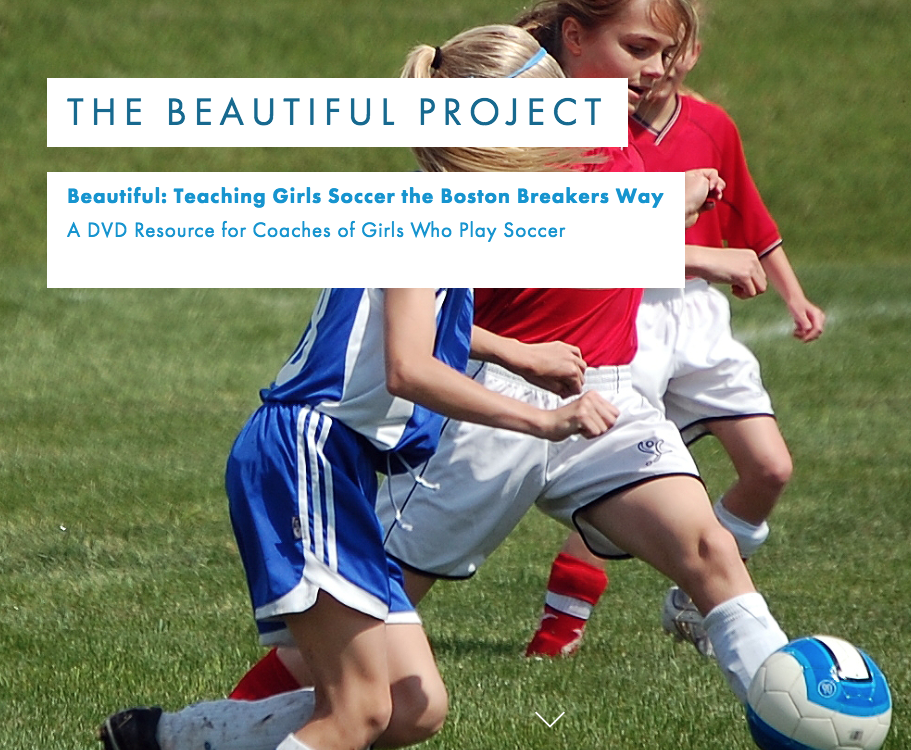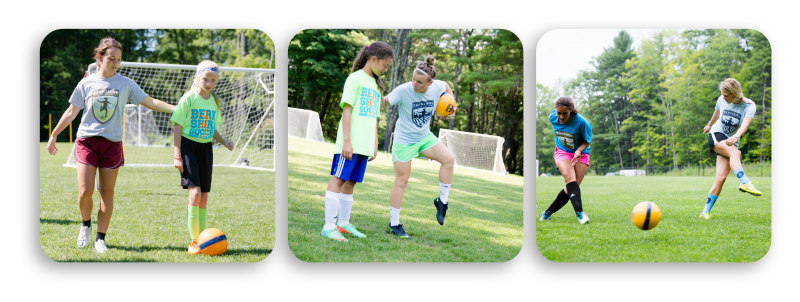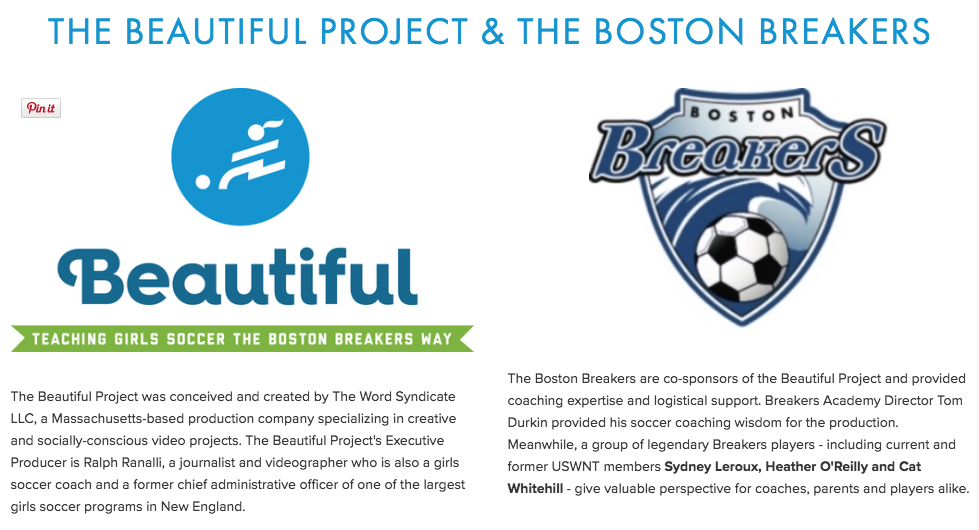Q&A With Executive Producer and Berky Dad, Ralph Ranalli

The Beautiful Project was conceived and created by The Word Syndicate LLC, a Massachusetts-based production company specializing in creative and socially-conscious video projects. The Beautiful Project’s Executive Producer is Ralph Ranalli, a journalist and videographer who is also a seasoned girl’s soccer coach and the former president of one of the largest girls soccer programs in New England. Ralph has three daughters, all of whom have played soccer. His middle daughter currently attends the Berkshire Soccer Academy and is entering her 2nd summer with us. We recently caught up with Ralph to discuss his exciting new video program, The Beautiful Project, which aims to educate soccer coaches and parents on the merits of coaching specifically to the unique needs of girls.
BSA: Can you discuss the inspiration behind and evolution of The Beautiful Project, as well as your involvement in the project?
RR: My three daughters all play soccer. Their home club is Newton Girls Soccer (in a suburb of Boston,) a unique program in that it’s one of the only town-based clubs in New England that caters entirely to girls. So I was immersed in this all-girls environment and was then asked to serve as president of Newton Girls Soccer. Professionally, I was a journalist for 25 years; I now own a media messaging company charged with telling interesting stories about important non-profit organizations. This new venture has enabled me to merge my dual passions of journalism and soccer, while jumpstarting my educational focus on what girl soccer players need. The more I researched and learned about this topic, the more I realized how few resources existed about the right way to coach girls. Most videos and online programs teach a unisex approach to soccer, with general coaching tips like how to receive the ball or take a corner kick, but nothing specific about the best way to coach girls. So, we began with a Kickstarter campaign to raise seed money for research and filming. The final phase of the project was getting approval of the content from both US Soccer and the NWSL (National Women’s Soccer League,) both of which we just received! The Boston Breakers are co-sponsors of the Beautiful Project and provided coaching expertise and logistical support. Tom Durkin, who is now Director of the Breakers Academy, provided his soccer coaching wisdom for the production. Current and former US Women’s National Team and Breakers players Sydney Leroux, Heather O’Reilly and Cat Whitehill also appear and share their knowledge. I am very proud of this project- it is really distinctive and covers all key topic areas. I think this will greatly impact how coaches and parents of girl soccer players will approach the girl’s game moving forward.

BSA: What makes girls so different from boys and why do you believe it’s vitally important to coach girls soccer in a distinctive way?
RR: There are so many differences between girls and boys. First, there are the physiological differences—in particular, the bodily changes that occur during puberty. As girls’ bodies grow and change during puberty, typically their hips expand, they gain weight and generally slow down. If coaches misinterpret these body changes and see them as signifying that a girl is not fit or healthy, the impact of this can be detrimental. Another physiological issue unique to girls is the “female athlete triad,” which is essentially the relationship between a girl’s nutrition, her menstrual cycle and bone density. If you take away one component of this triad (for example, by not getting proper nutrition, as would occur in an eating disorder,) this can delay the onset of puberty and can have long-term health repercussions. There are other fundamental differences in girls versus boys that relate to the interpersonal and social dynamics that girls experience. Girls mature socially much faster than boys and girls are very socially aware within a team context. This can work for or against you as a coach. If you get the girls to gel and bond as a team, this will reinforce hard work and teamwork, but if you yell at them and/or embarrass them in front of their peer group, or do not create a cooperative environment, then you will fail as a coach and girls may quit the team. (Did you know that girls quit at 6 times the rate of boys?) So, if you’re a parent coaching a girl and she quits, that girl will miss out on the many great benefits of sports. Study after study shows that girls who play organized sports have better outcomes across the board—they are healthier, they have higher grades, they are more social, and have better careers after school. In essence, the benefits of sports for girls are tremendous. That’s why it is so important that coaches take a girl-centric approach.
BSA: What, specifically, can a girl’s coach do to create the best possible environment in which these girls can reach their potential?
RR: The first thing a girl’s coach (and actually any coach in any sport) needs to realize is that he/she can have a major impact on players’ lives. That fact, alone, is awe-inspiring. Further, a girl’s coach needs to understand that girls respond to competition in a different way from boys. With boys, it’s glandular- they naturally want to compete. If you tell a group of boys they need to work harder and be more fit as a team, each boy will look around and point fingers. Then they will compete directly with one another. For girls, who typically internalize criticism, each one will think the coach is directing the comment at her. Girls want their social group to function well. No one wants to be the cause of friction or dysfunction in their group. So, it is important for coaches to use positive coaching techniques so that girls know they’re in a safe environment in which each girl feels supported and where it’s okay to take risks and make mistakes.

BSA: Can you talk about some of the injuries that girls seem more prone to than boys, and relate that back to the idea that girls need to be coached differently?
RR: ACL tears and concussions are two major injuries that girls suffer at much higher rates than boys. The key focus for ACL injuries is prevention through correct warm-up exercises and proper training. Our video has a chapter entitled “Pop Goes the ACL: Preventing Knee Injuries,” which includes a warm-up and proper training techniques specifically geared to help avoid ACL injuries. Girls are also more prone to concussions than boys. Girl’s soccer is ranked #2 in youth sport concussions (after youth football.) And, despite popular belief, only 30% of concussions come from headers. Most concussions result from player collisions and falls where girls come into contact with the ground. Since girls have less upper body and neck strength than boys, when they collide or fall to the ground, they are not as able to control their head to prevent torqueing. The “Head Start” chapter in our video directly addresses this issue by teaching girl-specific upper body training.
BSA: What do you hope will come out of your work with The Beautiful Project?
RR: Our fundamental goal is to make sure that girls are coached as girls, and everything that entails. And, we want to raise awareness of how unique girl athletes are and that taking a unisex approach to coaching does not address the needs of girls. People must be educated not only to understand those needs, but also, to coach in a direct, focused way to meet those needs. We have found that girl-centered, positive coaching will ultimately lead girls to succeed. Ideally, this increased awareness and education about coaching girl’s soccer will result in more girls reaping the benefits of playing sports as well as more young women coaching sports.
BSA: I know one of your daughters will be attending her second summer at Berkshire Soccer Academy this year. How did you learn about BSA and why did your family decide that BSA was the right soccer program for you?

RR: My wife is from Pittsfield, Massachusetts. We spent a lot of time in the Berkshires and had heard great things about the Academy. The grandparents live nearby, so that gave us a little extra comfort with sending our daughters away to sleep-away camp for the first time. We knew BSA would be a great experience for our daughters and the fact that it was a soccer program specifically for girls was a huge selling point. I am the #1 believer that girls deserve their own focused approach. Clearly, the Berkshire Soccer Academy shares that belief.
BSA: Who is the ideal target audience for this video? Is it aimed solely at parents who coach girl’s soccer? Or will the video also appeal to all “soccer moms & dads?”
RR: The project is actually aimed at two groups: 1) parent coaches (not professional coaches) who coach girls on rec and town travel teams; and 2) parents of female soccer players who play rec and travel soccer and who attend soccer camps. For the first group, there is very little literature and research available about coaching girls. Even most resources on the web are unisex and not specific to girls, so we are offering something very unique here. For parents of soccer-playing girls, this video will be an invaluable resource, as it will provide a framework for them to consider whether their daughter is getting the right kind of coaching, while helping to understand the psychological and physiological changes she’s going through and how these impact her soccer. There are also helpful tips on girls’ physical health, finding the right nutrition/training balance, and psychology.
BSA: Where can one purchase The Beautiful Project video and what is the cost?
RR: The video is currently available via digital download. Additionally, we have a DVD version that is available for sale on our web site as well as at the on-site store at Berkshire Soccer Academy this summer. The digital download costs $19.99 and the DVD format is $24.99. We will offer BSA athletes a discounted rate if they purchase the DVD through the Academy’s web site or at the on-site store.




